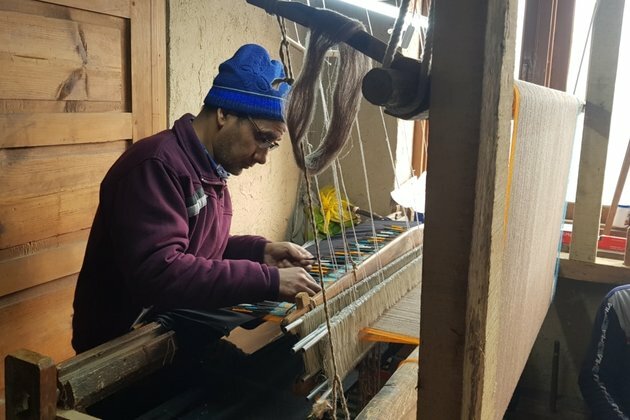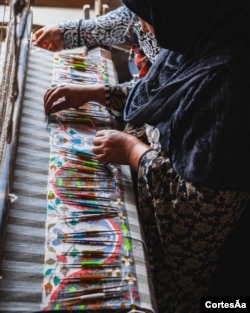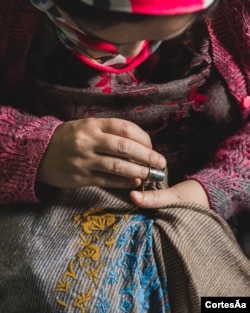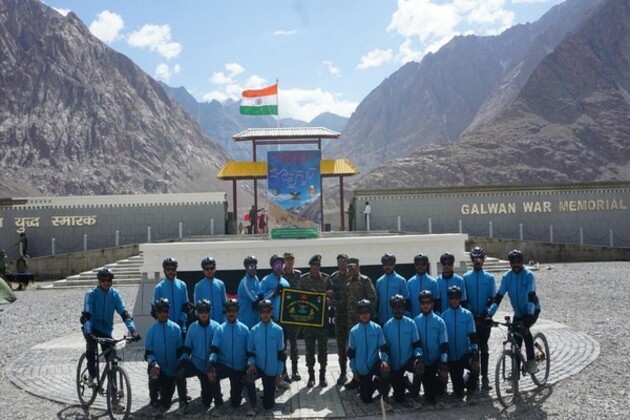India-China Standoff Puts Pashmina Wool Industryin Jeopardy
Voice of America
26 Nov 2021, 11:36 GMT+10

SRINAGAR, INDIA-CONTROLLED KASHMIR / LEH, INDIA - A 17-month-old standoff between India and China in the Himalayan border region of Ladakh is imperiling the six-century-old Pashmina wool industry, which employs almost three-quarters of a million people, according to industry leaders.
Soldiers from the two countries stood eye to eye in the disputed region for more than a year after a June 2020 clash in the Galwan valley of eastern Ladakh that left 20 Indian and four Chinese soldiers dead, according to reports, and tensions remain high.

The dispute has cut off almost all access to pastureland around the area where Ladakhi nomads have long herded an estimated 250,000 Pashmina-producing Changthangi goats at altitudes above 4,200 meters.
The Indian army "is not allowing the shepherds to go to the high altitudes for the grazing and hence it has affected the production of the wool," said Zakir Hussain Zaidi, a businessman based in Leh, a town in India's neighboring Himachal Pradesh state, who procures the wool directly from nomads.
Pashmina wool, the finest version of cashmere, is six times thinner than human hair and highly prized in the international market. While most of the world's cashmere comes from Mongolia, an authenticated hand-embroidered Kashmiri Pashmina scarf can sell for several thousand dollars in the United States and Europe.

Pashmina exporter Abdul Hamid Punjabi, a former president of the Kashmir Chamber of Commerce and Industry, told VOA the border friction is just the latest problem to beset Pashmina fiber production.
Other factors include lockdowns due to the worldwide COVID-19 pandemic and India's abrupt move in 2019 to abrogate Article 370, which provided a degree of autonomy to the disputed region of Jammu and Kashmir where much of the wool is processed. The move was accompanied by a massive security clampdown and prolonged curfew.


India Scraps Kashmir's Decades-Old Special Status Amid Massive Security Clampdown
Both the lockdowns and the curfew have severely impacted all aspects of the Kashmiri economy, including the Pashmina sector, according to Sheikh Ashiq, president of the Kashmir Chamber of Commerce and Industry.
Sluggish global demand and poor quality control by some traders have also contributed to a decline in Pashmina sales, said Mahmood Ahmad Shah, director of Handicrafts and Handloom Kashmir. He told VOA that exports of the prized shawls have declined from $41 million in 2018-19 to just $23.16 million in 2020-21.

Mujtaba Kadri, founding director of the luxury international cashmere brand Me&K, blames the industry's decline in part on the low wages offered by manufacturers to weavers and artisans.
"At an individual level I am trying my best and pay 50% more to my artisans compared to what others pay," said Kadri, who employs more than 300 women as spinners and runs programs for women to learn to work on spinning wheels known as charkhas.
Pashmina industry leaders responded to the mounting crisis last summer by founding the Kashmir Pashmina Organization to advocate for their interests. The president of the association, Mubashir Ahmad Shaw, told VOA that prices for raw Pashmina will rise because of the border friction, affecting the well-being of about 700,000 people who are associated with the trade.

The price of a kilogram of raw Pashmina has already risen from $37 to $47, according to Junaid Shahdhar, executive managing director at the Pashmina manufacturing and marketing company Phamb Fashions Pvt Ltd.

The industry problems are reverberating in Ladakh, where an estimated 1,600 to 1,700 nomadic families maintain a hardscrabble existence rearing the Changthangi goats that produce the precious fiber.
"They are living a very hard life and their children don't want to continue with it," said Konchok Stanzin, a councilor representing a border constituency on the Ladakh Autonomous Hill Development Council.

Stanzin recently presented a list of demands to Indian Defense Minister Rajnath Singh, requesting an allotment of land in the city of Leh for border residents who are finding life is no longer viable near the tense Line of Control that separates India from China.
 Share
Share
 Tweet
Tweet
 Share
Share
 Flip
Flip
 Email
Email
Watch latest videos
Subscribe and Follow
Get a daily dose of Mexico Star news through our daily email, its complimentary and keeps you fully up to date with world and business news as well.
News RELEASES
Publish news of your business, community or sports group, personnel appointments, major event and more by submitting a news release to Mexico Star.
More InformationLifestyle
SectionMethionine Restriction Could Extend Lifespan, Boost Health
VILNIUS, Lithuania – A growing body of research suggests that selectively restricting a single nutrient in our diet could have profound...
"Should be no such accident in future": G Kishan Reddy on calls for high-level committee after Sangareddy factory blast kills 34
Sangareddy (Telangana) [India], July 2 (ANI): Following the Sigachi Pharma chemical factory explosion in Telangana's Sangareddy district...
Daily World Briefing, July 2
U.S. Senate passes Trump's landmark mega-bill The GOP-led Senate on Tuesday passed U.S. President Donald Trump's One Big Beautiful...
Army's cycling expedition covers 312 km from Nyoma to Galwan in tribute to fallen "bravehearts"
Leh (Ladakh) [India], July 2 (ANI): GOC Trishul Division's Galwan Cycling Expedition team covered a distance of 312 km from Nyoma to...
Syrians in Trkiye look homeward as tensions ease
by Burak Akinci ANKARA, July 1 (Xinhua) -- Yousouf Al Sharif, a 35-year-old furniture worker from Syria living in Ankara, is thinking...
Central Administrative Tribunal holds RCB "responsible" for Bengaluru stampede
Bengaluru (Karnataka) [India], July 1 (ANI): The Central Administrative Tribunal (CAT) on Tuesday stated that it was the Royal Challengers...
International
SectionNative leaders, activists oppose detention site on Florida wetlands
EVERGLADES, Florida: Over the weekend, a diverse coalition of environmental activists, Native American leaders, and residents gathered...
Beijing crowds cheer AI-powered robots over real soccer players
BEIJING, China: China's national soccer team may struggle to stir excitement, but its humanoid robots are drawing cheers — and not...
COVID-19 source still unknown, says WHO panel
]LONDON, U.K.: A World Health Organization (WHO) expert group investigating the origins of the COVID-19 pandemic released its final...
Fox faces $787 million lawsuit from Newsom over Trump phone call
DOVER, Delaware: California Governor Gavin Newsom has taken legal aim at Fox News, accusing the network of deliberately distorting...
DeepSeek faces app store ban in Germany over data transfer fears
FRANKFURT, Germany: Germany has become the latest country to challenge Chinese AI firm DeepSeek over its data practices, as pressure...
Canadian option offered to Harvard graduates facing US visa issues
TORONTO, Canada: Harvard University and the University of Toronto have created a backup plan to ensure Harvard graduate students continue...













